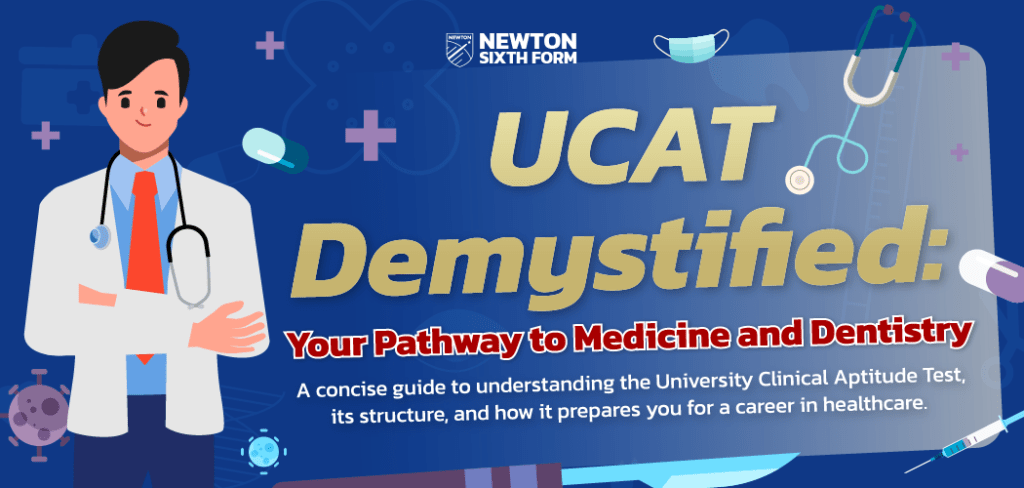
UCAT Demystified: Your Pathway to Medicine and Dentistry
A concise guide to understanding the University Clinical Aptitude Test, its structure, and how it prepares you for a career in healthcare.
UCAT: A Quick Overview
If you’re a prospective medical or dental student, you’ve probably heard of the UCAT. But what exactly is it, and why is it so important? Let’s break it down step by step to help you better understand this essential exam.
What is the UCAT?
The UCAT (University Clinical Aptitude Test) is an admission test that helps universities select applicants to their medical and dental programs. UCAT scores are used most in the United Kingdom, Australia, New Zealand, as well as the international medical admission program in Thailand.
UCAT is a computer-based test offered by Pearson VUE test centers. For Thai applicants, you may choose Pearson Professional Centers-Bangkok, Thailand as a location for testing.
Think of it as a test that evaluates how you think rather than what you know. The UCAT aims to see how well you can deal with complex information, solve problems, and make decisions under pressure—skills crucial for any future doctor or dentist.
What's Covered in the UCAT?
The UCAT is divided into five sections, each designed to test different skills:
1.
Verbal Reasoning
This section tests your ability to critically read and interpret information. You’ll be given passages of text and asked to answer questions based on the information provided.
2.
Decision Making
In this section, you’re asked to make decisions based on given scenarios or data. It involves logic, probability, and critical thinking. You’ll need to interpret graphs, evaluate arguments, and decide on the best course of action.
3.
Quantitative Reasoning
This section involves basic mathematical skills, but it’s more about solving real-world problems than complex algebra. The key is to work quickly and accurately.
4.
Abstract Reasoning
Abstract reasoning tests your ability to identify patterns and relationships in shapes and symbols. This section may seem daunting at first, but once you start recognizing the patterns, it becomes a bit like solving puzzles.
5.
Situational Judgment
Situational judgment assesses how you respond to different scenarios, particularly ethical and professional dilemmas you might face as a healthcare professional. You’ll need to evaluate the most appropriate actions and decide what’s in the best interest of your patient.
How Long is the UCAT?
The UCAT is a time-pressured exam, and knowing how long each section lasts is essential for effective preparation and time management during the test. The total exam time is under 2 hours (111 minutes), with a specific time limit for each section:
Verbal Reasoning – 22 minutes for 44 questions
Decision Making – 37 minutes for 35 questions
Quantitative Reasoning – 26 minutes for 36 questions
Abstract Reasoning – 12 minutes for 50 questions
Situational Judgment – 26 minutes for 69 questions
Since the test is computer-based, each section will be timed separately, meaning once the time for one section is up, you’ll move on to the next. There are no breaks between sections, so it’s essential to stay focused and pace yourself throughout the two hours. Practicing under timed conditions is the best way to get used to this fast-paced environment.
When is the UCAT?
The UCAT is held once a year, typically between July and September. Registration usually opens in May, giving you plenty of time to prepare. It’s best to book early to secure your preferred test date and location. Since the exam is taken online at test centres, you’ll have flexibility in choosing a time that works best for you.
You may only test once in any year. Multiple testing will be treated as Misconduct.
Putting it all together
In a nutshell, the UCAT is your gateway to studying medicine or dentistry, offering universities a snapshot of your cognitive abilities and decision-making skills. By testing your verbal reasoning, decision making, quantitative reasoning, abstract reasoning, and situational judgement, the exam helps schools assess whether you have what it takes to excel in these demanding fields.
Remember, the UCAT isn’t about testing your knowledge of science or maths—it’s about how you think and how you’ll handle the pressures of a healthcare career. With proper preparation, you can confidently tackle the UCAT and get one step closer to your dream of becoming a doctor or dentist.
Now that you know what to expect, head on over to the UCAT official website provided below for more information and practice tests. Good luck!
เขียนโดย: Newton UCAT Team, The Newton Sixth Form
เรียบเรียงโดย: Wareeya Saeyang Integrated Marketing Communication Officer






